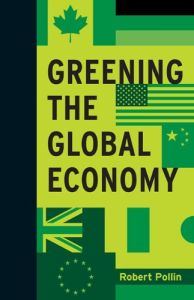Join getAbstract to access the summary!

Join getAbstract to access the summary!
Robert Pollin
Greening the Global Economy
MIT Press, 2015
What's inside?
This knowledgeable, straightforward climate change report explains the need for energy efficiency.
Recommendation
Massachusetts Institute of Technology professor and energy expert Robert Pollin makes a complex subject understandable in this discussion of the catastrophic losses humanity faces if it doesn’t confront the significant challenge of climate change. Pollin’s coherent narrative explores various aspects of this problem, starting with how human consumption of fossil fuels leads to greenhouse gas emissions, which cause climate change. He counters claims that reducing emissions reduces economic growth and details a comprehensive plan to cut emissions that can generate prosperity and jobs. getAbstract recommends Pollin’s rational overview of this complex problem to investors, entrepreneurs, students, policy makers, and executives who work with long-term planning for profit or nonprofit organizations.
Summary
About the Author
Robert Pollin is a professor of economics and co-director of the Political Economy Research Institute at the University of Massachusetts Amherst. He consulted on energy policy for the US Department of Energy, the International Labor Organization, and other organizations.


















Comment on this summary